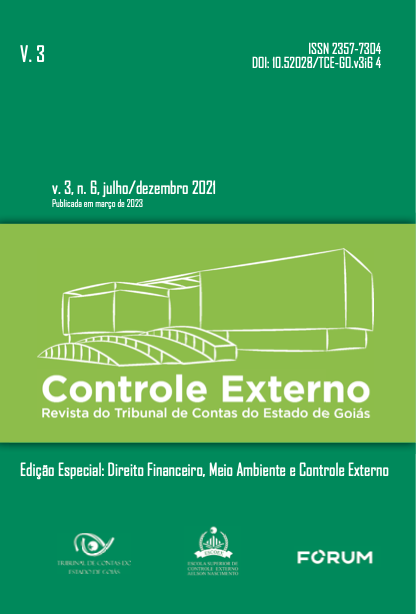Temas emergentes em ESG: uma revisão da literatura
DOI:
https://doi.org/10.58899/TCE-GO.v3i6-art10Palabras clave:
ESG, Métricas, SRI, Revisão de literaturaResumen
Artigo traz revisão da literatura acerca do tema ESG e as contribuições principais da produção acadêmica. Primeiramente, fornece um mapeamento da bibliografia na tentativa de identificar uma atenção acadêmica desproporcional sobre a pesquisa na área, o que contribui para uma desconexão significativa entre os diferentes temas de pesquisa do SRI e ESG e, por consequência, um desvio em relação ao objetivo final do SRI, que é tornar a empresa mais ética e sustentável aos stakeholders. Em segundo lugar, aponta novos insights sobre a importância das métricas ESG por meio de um panorama sobre a os termos que compõe o conceito, abordando sua evolução conceitual de forma longitudinal, além de identificar as principais publicações acadêmicas e autores que abordam o tema e, finalmente, mapear oportunidades de estudos futuros e direcionamento das pesquisas sobre o tema na literatura acadêmica.
Descargas
Citas
BENSON, K. L.; HUMPHREY, J. E. Socially responsible investment funds: investor reaction to current and past returns. Journal of Banking & Finance, v. 32, n. 9, p. 1850-1859, 2008.
CALLAHAN, J. I. Writing literature reviews: A reprise and update. Human Resource Development Review, v. 13, n. 3, p. 271-275, 2014.
CAPELLE?BLANCARD, G.; MONJON, S. Trends in the literature on socially responsible investment: Looking for the keys under the lamppost. Business ethics: a European review, v. 21, n. 3, p. 239-250, 2012.
CHOSSUDOVSKY, M. Economic reforms and social unrest in developing countries. Economic & Political Weekly, v. 32, p. 1.786-1.788, 1997.
DINESEN, C. Absent management in banking: How banks fail and cause financial crisis. London: Palgrave MacMillan, 2020.
DOMINI, A. Socially responsible investing: making a difference and making money. Chicago: Dearborn Trade, 2001. DOMINI, A. L.; KINDER, P. D. Ethical Investing. Reading: Addison-Wesley, 1986.
DORFLEITNER, G.; HALBRITTER, G.; NGUYEN, M. Measuring the level and risk of corporate responsibility: An empirical comparison of different ESG rating approaches. Journal of Asset Management, v. 16, n. 7, p. 450-466, 2015.
EASTMAN, W. Ideology as rationalization and as self-righteousness. Business Ethics Quarterly, 23, 527-560, 2013.
FERRERO-FERRERO, I.; FERNÁNDEZ-IZQUIERDO, M. A.; MUÑOZ-TORRES, M. J. Can Board Diversity Enhance the Integration of ESG Aspects in Management System? International Conference on Modeling and Simulation in Engineering, Economics and Management, 1-9, 2013.
FRANKEL, T. Fiduciary law in the twenty-first century. Boston University Law Review, v. 91, p. 1.289-1.299, 1989.
FREEMAN, R. E. Strategic Management: a Stakeholder Approach. Cambridge: Cambridge University Press, 1984.
FREITAS, V. P. Reflexos da ESG nas atividades da advocacia empresarial e ambiental. ConJur, 21 fev. 2021. Disponível em: www.conjur.com.br/2021-fev-21/reflexos-esg-atividades-advocacia-empresarial-ambiental. Acesso em: 6 fev. 2023.
FRIEDE, G. Why don’t we see more action? A metasynthesis of the investor impediments to integrate environmental, social, and governance factors. Business Strategy and the Environment, v. 28, n. 6, p. 1.260-1.282, 2019.
FRIEDE, G.; BUSCH, T.; BASSEN, A. ESG and financial performance: aggregated evidence from more than 2000 empirical studies. Journal of Sustainable Finance & Investment, v. 5, n. 4, p. 210-233, 2015.
FUKS, A. Social Conflict in Ancient Greece. Jerusalem: The Magnes Press, 1984.
GRECO FILHO, V. O Combate à Corrupção e a Lei de Responsabilidade das Pessoas Jurídicas (Lei no 12.846, de 1o de agosto de 2013). Revista Jurídica ESPM, São Paulo, v. 9, p. 15-30, 2016.
DUQUE-GRISALES, Eduardo; AGUILERA-CARACUEL, Javier. Environmental, Social and Governance (ESG) Scores and Financial Performance of Multilatinas: Moderating Effects of Geographic International Diversification and Financial Slack. Journal of Business Ethics, v. 168, n. 2, p. 315-334, 2019.
HULLAND, J.; HOUSTON, M. B. Why systematic review papers and meta-analyses matter: An introduction to the special issue on generalization in marketing. Journal of the Academy of Marketing Science, v. 48, p. 351-359, 2020.
MAJOCH, A. A.; HOEPNER, A. G.; HEBB, T. Sources of stakeholder salience in the responsible investment movement: why do investors sign the principles for responsible investment? Journal of Business Ethics, v. 140, n. 4, p. 723-741, 2017.
MINTZBERG, H. The case for corporate social responsibility. Journal of Business Strategy, v. 4, n. 2, p. 3-15, 1983. OCEAN TOMO. Ocean Tomo – Intelectual Capital Equity. Retrieved from Intangible Asset Market Value Study. Disponível em: www.oceantomo.com/intangible-asset-market-value-study. Acesso em: 6 fev. 2023
O’SULLIVAN, P. Levels of critique: a methodological framework for the study of ethics and morality in business. In: O’SULLIVAN, P.; SMITH, M.; ESPOSITO, M. Business Ethics: A Critical Approach Integrating Ethics Across the Business World. Milton Park: Routledge, 2012.
PAUL, J.; BENITO, G. R. A review of research on outward foreign direct investment from emerging countries, including China: What to we know, how do we know and where should we be heading? Asia Pacific Business Review, v. 24, n. 1, p. 90-115, 2018.
PAUL, J.; MAS, E. Toward a 7-P framework for international marketing. Journal of Strategic Marketing, p. 1-21, 2019. POST, C.; SARALA, R.; GATRELL, C.; PRESCOTT, J. E. Advancing theory with review articles. Journal of Management Studies, v. 57, n. 2, p. 351-376, 2020.
RHODES, C. Democratic business ethics: Volkswagen’s emissions scandal and the disruption of corporate sovereignty. Organization Studies, v. 37, p. 1.501-1.518, 2016.
SEMENOVA, N.; HASSEL, L. G. On the validity of environmental performance metrics. Journal of Business Ethics, v. 135, n. 2, p. 249-258, 2015.
THE GLOBAL COMPACT. Who Cares Wins. Connecting Financial Markets to a Changing World. Disponível em: https:// pt.scribd.com/fullscreen/16876740?access_key=key-16pe23pd759qalbnx2pv. Acesso em: 6 fev. 2023.
VELTE, P. Women on management board and ESG performance. Journal of Global Responsibility, 2016.
Descargas
Publicado
Número
Sección
Licencia
Os direitos autorais dos artigos publicados nesta revista são de propriedade dos autores, com direitos de primeira publicação para o periódico. Em virtude da aparecerem nesta revista de acesso público, os artigos são de uso gratuito, com atribuições próprias, para fins educacionais e não-comerciais.





